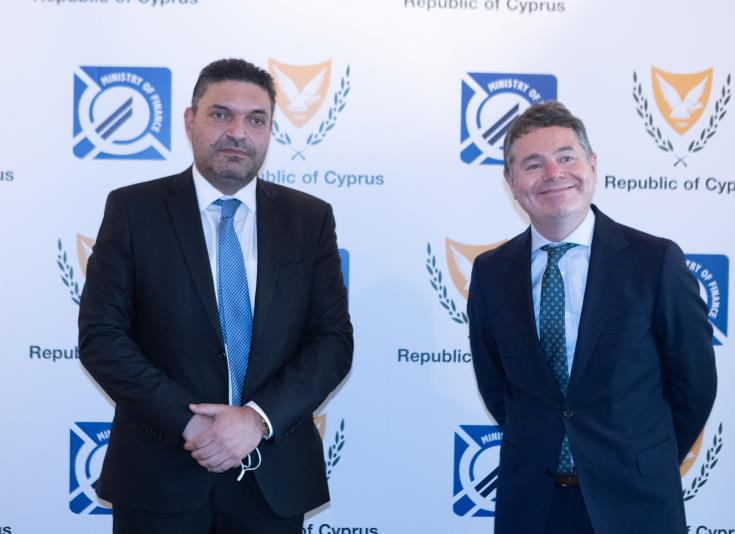The President of the Eurogroup Pascal Donohiu described the recovery of the Cypriot economy after the pandemic crisis of 2020 as impressive, emphasizing that this course was a result of the policies of the Cypriot authorities but also of the decisions taken at European level.
Mr. Donohiu, who is visiting Cyprus today, met with the Minister of Finance Konstantinos Petridis, who stated that from the beginning of next year Cyprus will regain a large part, if not all, of the land lost in the coronavirus crisis. .
In their joint statements, both the Irish Ministry of Foreign Affairs and Mr. Petridis stressed the importance of participation in the European family and in the eurozone.
"The performance of the Cypriot economy and its recovery is very impressive and it was a combination of the right national economic decisions and the right decisions at European level and I believe that the mixture of these decisions will allow the Cypriot people to continue to recover from its effects. "said in his statements the Irish Ministry of Finance and chairman of the group of finance ministers of the eurozone.
Mr. Donohiou praised the expertise of both the Cypriot Ministry of Finance and his team at the Ministry of Finance, which, as he said, is reflected in the Cyprus Recovery and Sustainability Plan, which will be discussed next Monday at the level of EU Finance Ministers (ECOFIN).
The plan, he added, "was warmly welcomed by EU member states and is already being touted as a really strong plan to help Cyprus out of this terrible disease."
He noted that the forecasts for the Cypriot economy point to a recovery of over 4% in 2021 and below 4% next year.
"This is a really strong economic performance in terms of how severe this disease was and it is particularly strong given that Cyprus, like other European countries, places a significant value on tourism for the labor market and economic development," he said.
Return to "normal" financial decisions
Finally, Mr. Donohiu encouraged the changes that are taking place in the Cypriot economy, noting that at some stage, which he did not specify, the journey of returning to sensible economic decisions and reducing debt will begin.
"We are all borrowing at the moment to support our economies because we have to do it and at the right place we have to start the journey on how to reduce borrowing and return to more normal policies and as a Union we will see what is right. "At this point we will start this journey and when it starts we will all have to do our part to implement the decisions that will be needed," he said.
In his own statements, the Cypriot Ministry of Foreign Affairs said that after the recession of 5,1% in 2020, which was the lowest among the countries with large tourism sectors, the European Commission predicts a recovery of 4,3% in 2021.
"We therefore believe that by early 2022 we will have recovered most if not all of the land lost due to the pandemic," he said.
Reiterating the high degree of uncertainty that remains, Mr. Petridis said that Cyprus is taking advantage of the avoidance clause of the EU Stability Pact "but our joint effort is the gradual return to normalcy".
Mr. Petridis stressed the importance of the reforms that preceded the coronavirus crisis, which allowed Cyprus to be a constructive member of the eurozone, but also to borrow on favorable terms from the markets to face the crisis and maintain a positive sign from the evaluation.
"And these reforms," he concluded, "fiscal discipline imposed in times of crisis are what we need to protect." Either these reforms concern fiscal discipline or they concern the banking sector itself and the effort to reduce NPLs. "All of these are preconditions for our existence in the Euro, the largest monetary union, which is very important to be a member of, in order to protect our fellow citizens."
Tax agreement that recognizes small and medium-sized economies
Asked about Ireland's position on the agreement for the imposition of a global minimum corporate tax of 15%, Mr. Donohiu, speaking as an Irish Minister of Foreign Affairs, said that his country wants an agreement at the level of the Organization for Economic Co-operation and Development because we believe that an agreement, if reached, can bring stability to issues that are important for the future of the world economy.
"I also want an agreement that is capable of recognizing both small and medium-sized economies, and that is why discussions on the global minimum tax rate are sensitive and difficult," he added.
He said, however, that Ireland would continue to be part of the ongoing negotiations "and I hope we will be part of the agreement in the future because I believe that if there is an agreement it will create challenges in some countries, including Ireland, but I believe these challenges and the costs are worth bearing if we have an agreement on really sensitive issues like global tax policy, ”he concluded.
Answering a question, he stressed that the principle of unanimity in the EU on some policy areas is very important, but added that an effort should be made to reach unanimous decisions by consensus.
